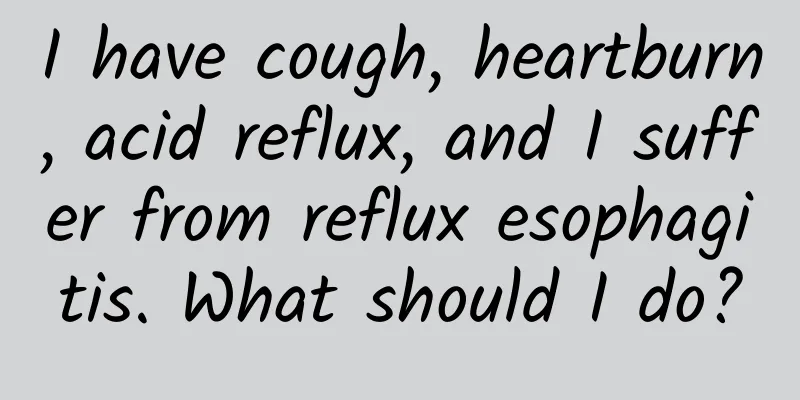I have cough, heartburn, acid reflux, and I suffer from reflux esophagitis. What should I do?

|
A friend left a message to Huazi, saying that he always felt heartburn and acid reflux every night, and sometimes had a severe cough. He thought he had a cold at first, but after taking cold medicine for a few days, it didn't get better. He went to the hospital for a check-up and found out that he had reflux esophagitis. He asked Huazi what to do and what to pay attention to when treating reflux esophagitis? Hua Zi said that reflux esophagitis has the same characteristics as chronic diseases, showing chronicity, progression, and may cause complications, and has a high recurrence rate after treatment. Long-term maintenance treatment is usually required to control the disease. 1. Why does reflux esophagitis occur? Reflux esophagitis refers to the reflux of gastric contents into the esophagus, where they remain for a long time. The gastric contents contain attacking factors such as gastric acid, pepsin, and bile acid, which can cause self-digestion and damage to the esophageal mucosa, leading to symptoms such as acid reflux, heartburn, and pain behind the sternum. Gastric acid is somewhat volatile. After the acid mist passes through the throat, it will irritate the respiratory tract and cause severe irritating coughing. The cause of reflux esophagitis is motor dysfunction of the esophagus, stomach and other muscles. Overeating, diabetes, high-fat diet, hiatal hernia and other factors are common triggering causes. 2. Lifestyle intervention for reflux esophagitis Lifestyle intervention is the basis for the treatment of reflux esophagitis. Those with mild symptoms can be effectively relieved through lifestyle intervention. 1. Lose weight: If the patient is overweight, losing weight can effectively reduce acid reflux. 2. Quit smoking and drinking: Cigarettes and alcohol will irritate the gastric mucosa and aggravate the symptoms of gastroesophageal reflux. 3. Avoid eating at night: Reflux esophagitis is prone to occur at night, so do not eat 3 hours before going to bed, and do not overeat. 4. Raise the head of the bed: Lying flat can easily induce acid reflux. Raising the head of the bed or using a pillow to raise the head and neck by about 10 cm can alleviate the symptoms. 5. Avoid irritating foods: Avoid eating irritating foods such as chocolate, coffee, spicy foods, and high-fat foods. 3. Drug treatment requires long-term maintenance of drug treatment for reflux esophagitis, mainly using acid-suppressing drugs. Commonly used are proton pump inhibitors (various "prazoles"), histamine H2 receptor antagonists (various "tidines") and new potassium ion competitive acid blockers (P-CAB). They can inhibit gastric acid production, alleviate symptoms, and promote the recovery of esophageal mucosal damage. For reflux esophagitis, the initial acid suppression treatment usually requires 8 weeks (4 weeks for P-CAB). Within 8 weeks, the esophageal mucosal inflammation of most people can heal. However, studies have shown that reflux esophagitis that has only undergone initial treatment has a 90% recurrence rate within 6 months of stopping medication. After the initial treatment, if maintenance treatment is continued for about 6 months, the recurrence rate is 28%. Repeated episodes of reflux esophagitis not only increase pain, but may also cause complications such as esophageal ulcers, esophageal stenosis, esophageal bleeding, and even esophageal cancer. Therefore, for the current drug treatment of reflux gastroesophagitis, most doctors tend to conduct an initial treatment of 2 months, and then maintain treatment at a low dose for up to 6 months. Within 6 months, even if there are no symptoms, low-dose acid suppression therapy should be continued to reduce disease recurrence and the risk of esophageal cancer. After 6 months, medication can be taken on demand or intermittently according to actual conditions. Severe reflux esophagitis can be treated with endoscopic or surgical methods. In summary, reflux esophagitis has similar characteristics to chronic diseases and requires long-term continuous treatment to effectively control symptoms. Acid-suppressing drugs are mainly used for treatment, and initial treatment plus maintenance treatment is a common treatment method. Specific drug selection needs to be carried out under the guidance of a doctor. If you have any questions about medication, please consult a doctor or pharmacist. I am pharmacist Huazi, welcome to follow me and share more health knowledge. |
<<: What is taro? How to store fresh taro
>>: Is taro the same as taro or is it just another name? What organ is the edible part of taro?
Recommend
The benefits of a woman's vagina
The body structure of women is very different fro...
Is there any relationship between pelvic effusion and sexual life?
Pelvic effusion is a common disease problem among...
Do I need to fast for chromosome test?
Sex chromosomes are the key carriers of genetic m...
The inner thigh root of the woman is particularly dark
This is a very embarrassing problem. Originally, ...
Treating osteoporosis cannot be done with just calcium
Osteoporosis is a systemic bone disease character...
Female genital herpes pictures
With the development of modern social economy, pe...
What kind of tea should women drink to maintain health?
With the development of economy and the improveme...
Can I do scraping before my period?
I believe most people are familiar with the scrap...
Can I go back to my parents' home during the Dragon Boat Festival? What should I buy when I go back to my parents' home during the Dragon Boat Festival?
The Dragon Boat Festival generally refers to the ...
What is the normal amniotic fluid index in the second trimester?
Women need regular prenatal checkups after pregna...
How to eat Gongcai? How to make Gongcai delicious
Gongcai is a pure natural wild vegetable, rich in...
What are the symptoms of early herpes in women?
Female genital herpes is a very common sexually t...
Quick treatment of nipple root fissure
Many women have certain health problems with thei...
What season is it when the frog wakes up? What is the approximate lifespan of frogs and toads?
Frogs often live in rivers, ponds, and rice field...
World Ovarian Cancer Day: You know nothing about women's eggs
The ovary is an important organ in the female bod...









